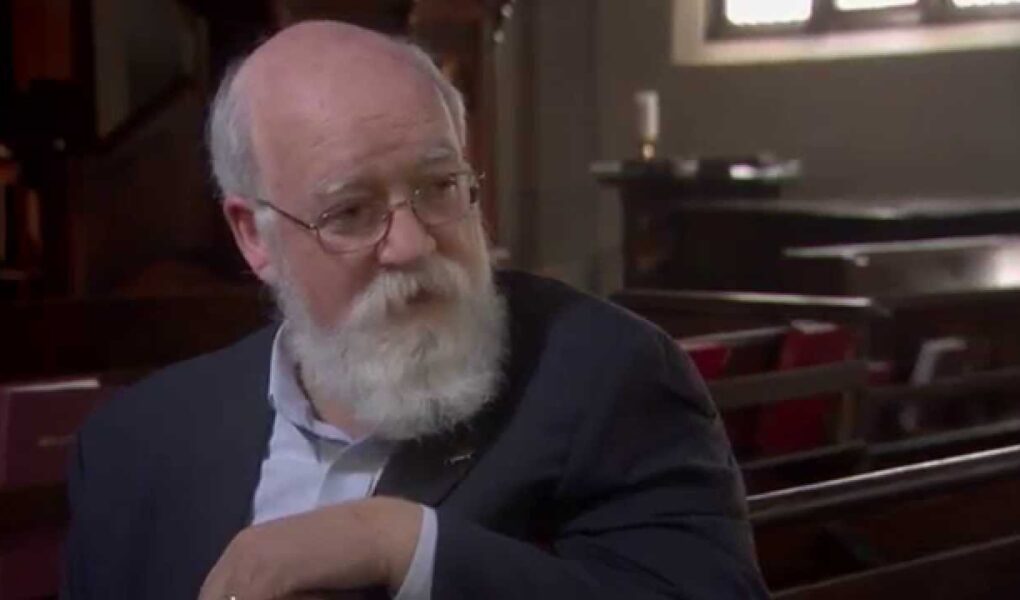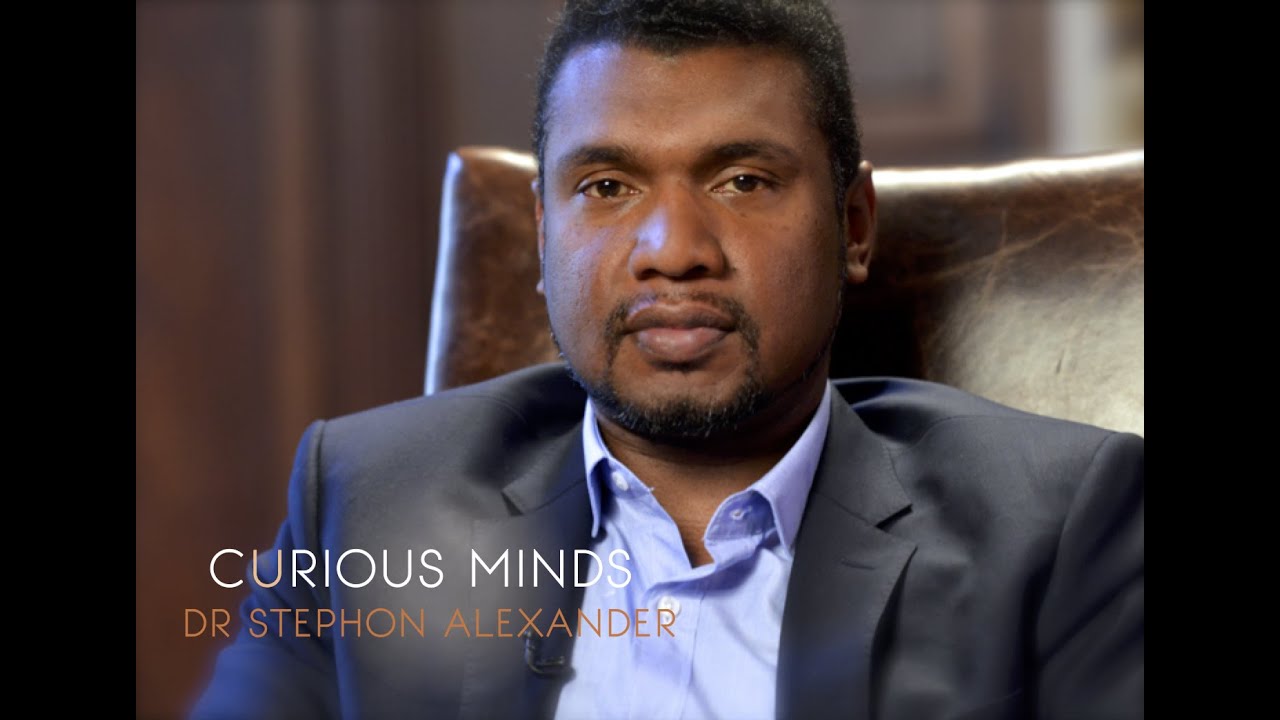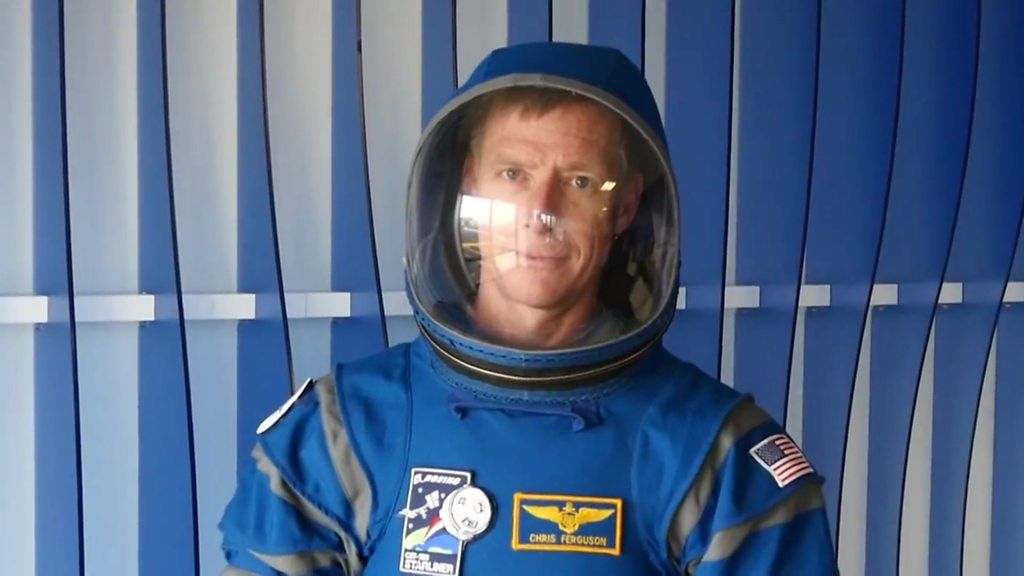Closer To Truth
Free will is a problem. If it seems obvious that you are perfectly free to choose and decide, then it seems perfectly clear that you do not understand the problem. Free will is a huge problem, because our sense of free will and the physical structure of the world contradict each other.
For more videos on “What is Free Will?” click here http://bit.ly/1I8iExc
For more on information and video interviews with Daniel Dennett, please visit http://bit.ly/1y49TBd Your source for the study of philosophy and college philosophy class materials.
Source




.
الفلسفة حكمة الأغبياء ، ما أجمل حكمة الله في كتاب الله العزيز الحكيم .لا اله الا الله .
Free will? ….silly humans, give me a break…..rare instance of idiocy from an otherwise great thinker. Free will? you have got to be kidding me.
Every individual is allowed to choose what God, in God's infinite wisdom and Love, might not choose.
Every individual is allowed to do something other than what God would do.
After all if an individual did not have free will, he or she would always choose what God would choose.
So free will by definition is the ability to choose something other than what God would choose.
In this way, God is able to explore and discover what happens when humankind make various choices; including unwise, unLoving and harmful choices.
What happens if every possible choice is allowed?
It's impossible to know if destiny is a real thing, because simply we can't rewind the our lives and see what other outcomes our actions would've had.
Free will the story of the good Samaritan.
the free will problem makes me think there are only 2 possible scenarios:
1. There is no free will and no soul.
2. There is free will and a soul.
both are great possible scenarios. On the former there is no need to ruminate on the past because it was impossible to choose otherwise, on the latter there is an afterlife with infinite hope to try life once again.
Free Will doesn't exist. It's that simple.
With that explanation, I’m even more convinced Christianity is the most plausible explanation as to why we feel overwhelmingly like we have free will
We are determined to be the masters of our fate to a surprisingly and gratifying degree- Dan Danett.
Fuck determinism, it is the one idea I'll never get behind, this world is an experiment the outcome is unknown else it would have had not reason to exist in the first place. If there is an allpowerful god that know how everything will turn out and let truly horrific things happen to good people and then letting evil people get away with doing evil while being able to stop it how is such a god not evil?
Makes more sense if god was good and he wanted you to do good things as he watches as the world he created to tell an untold story it would give everything a meaning a reason where as if everything was predetermined everything loses its meaning. I'm not a very religious person but I really do not understand why people believe that god is good and then believe he is omnipotent when there are truly horrific and unjust things happening in this world if god is omnipotent then every evil thing that ever took place and ever will was intended and planned by god beforehand. God by such a definition would be neutral at best.
When the antilope runs from the cheetah it's not the antilope that makes the decision, it's the chemicals in her body that work in unison together with hormones and memories to run from the predator in order to keep the body alive. Dennett makes the argument that the antilope avoids something but it's equally true that the organism just expresses its desire to survive.
In humans before we ask whether free will exist we should first ask whether "we" exist, because the assumption that free will exists collapses once the "I" is removed. And the "I" is nothing but an outcome of culturalisation and therefore your identity is false therefore your free will is a product of culture and society. If you try to answer the question "Who am I?" you will soon find out that your answer is nothing but a bunch of ideas the society and implicitly religion has put into your mind. You . . is just a fictitious character therefore you can't have any free will of your own whatsoever. Even the question of whether free will actually exists or not is a product of borrowed knowledge.
5:08 The stronghold of religion seems to be loosening up and people seem to be making concessions regarding free will not out of recognition of its futility but out of the realisation that the idea of free will is eroding and is also detrimental for the society.
oh, free will not wifi.
One piece fans say it's "HAKI" 🤣🤣🤣🤣
Dennett is a very clear example of Dunning Kruger. He is a very stupid prideful man posing as a thinker
You need way to many words to make your point. Free will is an illusion.
It seems that from the red spot on his head, that the brick was truly, all along, unavoidable.
Free will is a false notion.
There is will, there are actions.
The term free will postulates that there could of been another choice made but the choice itself depends on factors and the factors are what makes the will flow towards the choice.
The term “Free will” is completely ridiculous when it’s looked into deeply. It doesn’t make sense. Choice upon no factors would be completely worthless.
Therefore the individuals choice is free within the domain of body-mind
funny how he starts defending the concept w/o defining IT, just to acknowledge at the very end that IT has multiple definitions.
Seems to me that for such a clear thinker he dances around a lot in this matter. He kinda of does what Chalmers does with *the hard problem*. I would love to hear his answer to a question he asks Chalmers himself, i.e., 'what data made you come to this conclusion about free will?'.
Maybe he thinks its best for us to believe in it, even though it makes no sense from a materialist perspective. Like fitness vs. reality. That always puzzled me about him
I don't know about humans but I think God does not have total free will…
1. You can choose to cease to exist by committing suicide (God forbid!)…but God can never cease to exist…come what may…
So, how can God be called free?
2. You can choose to leave the path of goodness and start doing bad deeds…God can never ever even wish to do bad deeds..
So how come God has total free will??
So if you can change what is determined to be, was not your change also predetermined? If that's the case, then no change occurred. All things would then be predetermined, even change. So there is no such thing as randomness or free thought. So was Dennett free to come up with this conclusion or were the chemicals in his brain reacting together, link to link, thought to thought, since his conception in his mother's womb, to bubble up this thought in this point in time, in which he thought this thought and it became known to him? If this is the case, no one is responsible for their thoughts or actions. There is no such thing as love, hate, right, wrong, good or evil. You're simply an unprogrammed meat robot, trudging along in the illusion of life, which is not life at all, but simply reacting to the environment, which is also unprogrammed and predetermined like a character in a video game going from scene to scene. Your life has no purpose or meaning and the only choice you have is death, which that too would be predetermined. So death is not a choice and life is not a choice, which means there are no choices at all. And how did nature create this video game called life with such a sophisticated, unguided, self-reacting, unprogrammed program? Nature could not have created it, because nature itself would be predetermined. Nature isn't creating. It too is part of the video game, so it could not have created itself. Therefore, there must then be something outside of nature, something beyond nature, which created nature. Something beyond the physical, not subject to space, time or matter and the laws of physics and entropy. It would be maximally great, all powerful, all knowing, eternal, all good and loving, completely moral and just, and personal. It did not need to create, but it choose to create. This maximally great thing would be the ultimate of all things and anything created by it would fall short of its greatness, which means the characters in its video game, would be subject to their creator. And no matter how one feels about this maximally great creator does not matter, because feelings are an illusion, but the creator is not part of the illusion. It is the only thing that is real. So by believing in determinism, you have admitted that a maximally great thing exists, who created you and all things. I believe the characteristics of this maximally great thing describes God and is worthy of praise and worship, because he created all things through him and for him, for his purpose. As the creation, subject to the creator, you can choose to worship the creator, but that is not your choice. It is the choice of the creator to reveal himself to you. He determines, who he chooses. And since he is the creator of all things, he can make that choose. He is the only being with free will, because he is not subject to his creation. He is outside of it. He rules over it and who are we to say to our creator that we deserve to be one of his chosen. Who are we to say, it is wrong for him to send people to a place of torment. He creates some for Heaven and some for Hell, places which he has also created. And if you believe what Dennett says, you believe you can change and choose to accept God, but it was not a choice at all. You were predetermined to accept him. Or you can choose not to accept him, but again, you were predetermined not to accept him and go to Hell.
There is no free will. Dennett knows nothing about physics.
we have free will, take for example the mind body problem, not everything can be explaned by science, we are not entirely physical.
Crock o' shyte detected. "Free will" is a question of physics, and biology is physics. Dennett is an idiot.
Daniel dannet has the voice and looked like a perfect priest , 🤣🤣🤣. Short beautiful conversation. I like the set up it's like a catholic church..👍🏿.up to point philosopher 👏👏
It isn't physics, it isn't biology.
It's history. The concept of free will is a cultural leftover from the Protestant Reformation, Lutheran determinism vs Arminian open futurism. There is no point to secularizing it except to manipulate people's definitions of legal and moral responsibility, and it would be a pure manipulation, because no coherent definition of free will could be relevant to how legal and moral responsibility work.
I think Dennett is trying to say this without sounding like an asshole.
If free will did not exist, there would be no A la Carte menu in restaurants, only a menu, and only one of those.
Atheists are looking for an intelligent idiot to look up to because he plays their favorite note. Richard Dawkins is another phenomenon who sets a law for his own beliefs, which he preaches to others. Atheism is proof of free will that they chose this worldview and not the Christian faith.
I can tell you for a fact that if free will exists that all people don't have it all the time. Example a mental illness or development disorder can completely control your behavior and make you do things that nobody would ever choose. You won't even know it's happening. Maybe only a healthy mind has free will. But also if free will doesn't exist why does the conscious mind exist. It would be completely pointless and serve no purpose if it wasn't involved and there was no free will. Like a cruel joke
The problem is that we don't have the free will we experience. The meat machine makes choices based on some foundational idea of survival and wellbeing, and having choices, making choices, gives it free will. But our experience of free will is most likely just a side-effect of being sentient, the meat machine tricking our consciousness into rationalizing those choices.
As for the physics, as much as determinism makes sense in particle physics at small scales, the proposal that, given you have the exact initial conditions and limitless computing power, you can interpolate all following interactions over time, just cannot be true.
That would require a framework for reality with 10^80 particles interacting over 13+ billion years with no errors/divergence whatsoever.
Again, that just cannot be true.
The point he's trying to make is that we need the illusion, for if we see the future as "unavoidable" we may let ourselves be "hit" by events without taking action, at the excuse that it is all determined, so what difference would it make?
Free will in this sense is our capacity to interact with the world, to act in our own self interest. And, paradoxically, this was given to us evolutionary by enhancing our brains with the capacity of abstraction and interpretation.
We don't have free will, we can't see reality for what it is, and that is required for the illusion of free will to exist.
He's a joke.
You do have to choose between religion and biology. The choice is free. Only one choice is sensible.
His brick analogy where he invokes the definition of free will being defined by avoidance seems to be just another argument that if followed through arrives again at determinism. The inherent motivation to avoid is a hard baked pre determined response thus once again the illusion of choice is being given as evidence of free will. Explored in the opposite sense, the supposed free will choice to not avoid, would be so contrary to the instinctual force to avoid that it’s basic manifestation would have to be beyond choice and control and thus would be predetermined.
It really does seem that there is no argument for the existence of free will that cannot be followed through to a deterministic origin.
in my point of view there are rational choices and unconscious choices as already proven in experiments made by bejamin libet, but even when my brain chooses before i am aware of the choice it is still me choosing because i am my conscience it is my brain that chooses the question of the soul that has total free will has already been totally refuted we are influenced by everything around us our parents our family our friends now knowing that I can change the environment to be influenced by people I want to be influenced
This is why philosophical debates on free will are pointless: philosophers refuse to give a simple definition of free will. I can't decide if I believe in it or not because I don't know what it is and the people that are supposed to explain it can't.
My position is:
It doesn't matter if we have free will because it doesn't help us to understand the myth of "blame" and "moral responsibility". The more responsibility is, for me, a lie.
"The capacity to control complexity is free will." Boom.
We cannot for sure make sense of whether or not Dennett's theory around Free Will is true until we've solved consciousness. That's my read of it.
So far, it seems the mysticists of the world could still be right about the nature of consciousness. If they're not, and it's instead all a materialistic part of the giant causal web of deterministic events that will occur in the universe from its beginning to end, then Sam Harris makes much more sense to be regarding this subject. Because then there is no "rise of Biology and the explosion of avoidances" etc. Then we cannot discriminate between events, post- or pre-consciousness.
Fun fact: God thinks He can judge us because he gave us "free will". He literlly made us humans + everything else inclusive free will itself. Does that make any sense? No, God's is judging Himself.
Can someone please explain Dennett's position on free will for me? I've listened to so many of his talks but something about it just isn't clicking for me. It really sounds like determinism dressed in fancy clothes. When you redefine free will in this way you're moving away from any useful notion of free will and it's simply not what people generally mean when they say they have free will. Is he simply saying the concept itself is not important?
I think this definition of free will doesn’t carry nearly the same connotations most associate with it to the point of being almost dishonest.
I don't see that seeing, knowing, and reacting is any less deterministic. We are all part of the constant interaction of forces. First: Most people do not consider to dodge a brick. It's a reflex response… determined by past experience… the sum total of what has happened and what is happening.
The sum total of your person, your experience, your knowledge, and other internal factors are all dependent on the external factors that brought you to this point in this current circumstance. It's not THAT you can do what you want but WHY you want it. Even if the external world were filled with random macro elements, you're wants and actions would still be determined by them. Every internal (mental) factor is ultimately the result of external factors including your personal biology which you aren't free to choose either. If you think you have a soul you had no role in what that is that either.
I've always voted Libertarian since 1982 when I was 27 years old. I only discovered I am autistic at the age of 57,.. and that while I have always been free to choose my actions,.. but not my desires?! I am Libertarian substantially due to my autism?!?… so what happens to free will?!
You make the category mistake of assuming, as an unargued philosophical bias, that determinism equates to fatalism, when the Biblical account offers a very explanation…
Some people will do back flips somersaults to try to save free will without some sort of idea of a non physical actor. If you avoid something that was determined just as much as if you didn't avoid it.
If you can do what you want, when does anyone determine when they're wrong??
If you think that time, space and matter and energy is reality and consciousness is emergent property of functioning of a brain, than logically you will conclude that there can not be free will. But if consciousness is fundamental and basic principle that transcends time and space. And it is our real nature. And it is not conditioned and limited in any way. And that there is mechanics by which it can influence matter, energy, time and space. That makes free will possible. What is consciousness can not be understood or experienced through senses. But only directly experienced by it self. And it is our true self. So we can experience our self. And not with Intellect, mind or senses but It self can experience it self. This is what enlightenment means. It is nirvana, satori, samadhi, budha state, bodhisattva, Christ consciousness…
physciality constrains the thought, and since physicality is 'determined' by biological evolution, then our thoughts are also determined as well. But this does not explain free will in its purest sense.
Knowing that we can avoid and then gaining the information on how to avoid is again determined by causality..